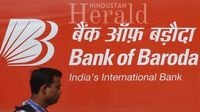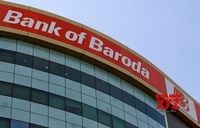Bank of Baroda, one of India’s largest public sector banks, is navigating a tumultuous financial landscape as it reported mixed quarterly results while facing market volatility. On May 7, 2025, the bank's stock was trading at ₹223.90 on the National Stock Exchange (NSE), a slight decrease of ₹0.01 or 0.0045% from its previous close of ₹223.91. The stock opened at ₹223.91 and reached a high of ₹227.44 during early trading hours, with a low of ₹222.16 noted for the day.
Despite the marginal changes in share price, Bank of Baroda has shown resilience amid broader market fluctuations, maintaining a market capitalization of ₹1.16 lakh crore, a price-to-earnings (P/E) ratio of 5.67, and a dividend yield of 3.39%. These factors make it an attractive option for income-focused investors.
The bank recently announced a 3.3% year-on-year increase in net profit for the fourth quarter of FY25, amounting to ₹5,048 crore, up from ₹4,886 crore in the same quarter last year. However, this growth was overshadowed by a 6.6% decline in net interest income (NII), which fell to ₹11,020 crore compared to ₹11,793 crore in the previous year. This decline raised concerns about the bank's core banking margins, particularly as rising interest expenses (up 10%) outpaced the growth in interest income (up 3.6%).
As a result, Bank of Baroda's net interest margin (NIM) dropped to 2.86%, the lowest in 14 quarters, from 3.27% a year ago. Although the bank's asset quality improved, with gross non-performing assets (NPAs) declining to 2.26% and net NPAs to 0.58%, the increase in provisions—up to ₹1,552 crore from ₹1,302 crore—indicates a cautious approach amid a shifting macroeconomic environment.
The bank's board has recommended a final dividend of ₹8.35 per share, with a record date set for June 6, 2025, reflecting confidence in its earnings and capital position. This dividend payout represents a significant 418% on the face value of ₹2 per share, marking the highest dividend declared by the bank.
Over the past year, Bank of Baroda's stock has experienced significant fluctuations. It reached a 52-week high of ₹299.70 but has also seen a low of ₹190.70. In the last month alone, the share price has decreased by 2.5%, while over the past year, it has lost 16%. The volatility is attributed to various factors, including geopolitical tensions and the bank's recent financial results.
The Indian stock markets, reflecting broader economic concerns, have shown volatility following the launch of "Operation Sindoor" by the Indian Armed Forces, which escalated tensions between India and Pakistan. Despite initial market dips, indices like the Sensex and Nifty managed to recover some losses, although Bank of Baroda's shares fell sharply by 10.91% on May 6 due to the weak financial results reported for Q4 FY25.
Investors looking to gauge Bank of Baroda's potential may find insights from platforms like InvestingPro, which estimates the bank's fair value at ₹251.1 per share, suggesting a potential upside of 12.2% from its current market price.
Bank of Baroda's performance is further influenced by its strong retail and corporate banking portfolio, bolstered by a large network of 8,424 branches as of March 2025. The bank also has a significant international presence with 84 overseas branches across 17 countries. This extensive reach, combined with government backing, positions Bank of Baroda as a key player in India's banking sector.
Looking ahead, the bank's future performance will largely depend on macroeconomic factors, interest rate trends, and its ability to maintain strong asset quality. Investors are advised to closely monitor the company's quarterly results and any significant announcements related to interest rate policies.
In summary, while Bank of Baroda faces challenges, including margin pressures and rising provisions, its improving asset quality, steady business growth, and generous dividend payout reflect a commitment to maintaining shareholder value. As the bank navigates this complex environment, understanding market trends and consulting with financial advisors will be crucial for investors considering an investment in Bank of Baroda.


